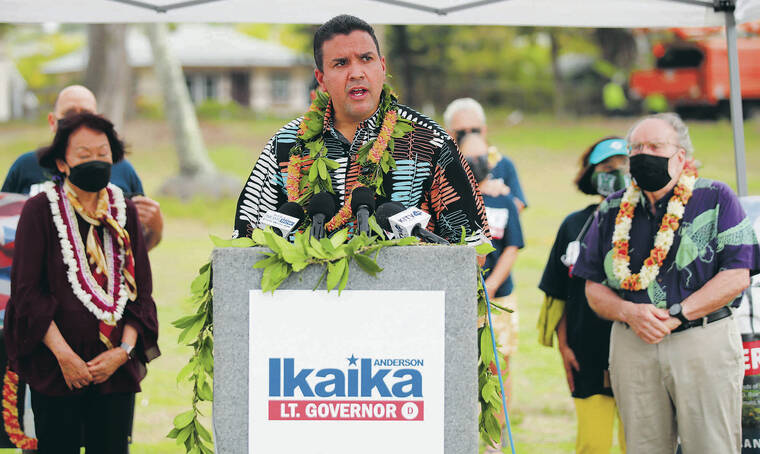Ikaika Anderson is prepared to explain to voters why he resigned his Windward City Council seat in 2020 saying he wanted to focus on caring for his Waimanalo grandparents who raised him, but ended up working for a mason’s union job that he left after nine months.
“It’s a fair question,” said Anderson, who abruptly announced that he was both giving up his chairmanship of the Council and the Council seat he held for 11 years in September 2020.
Questions about Anderson’s commitment to serve a full term as lieutenant governor are likely to hang over him during his campaign for the post, said John Hart, a Hawaii Pacific University communications professor.
“Once you have the marker, ‘Are you going to stay in this job?’, it is an issue,” Hart said. “He stepped down to look after Grandma, then took a union job and no longer has the union job. It is a cloudy narrative, and there’s been a bunch of chatter.”
If he’s chosen as the Democratic nominee for lieutenant governor in the Aug. 13 primary and goes on to win the general election on Nov. 8, Anderson said he intends to serve a full, four-year term.
“I’m running for lieutenant governor to serve as lieutenant governor. Period,” he said when asked if he would resign as lieutenant governor to pursue a potential congressional seat.
Anderson was dealing with undisclosed personal uncertainty when he announced his resignation as Council chairman.
At the time, Anderson publicly said he wanted to focus on caring for the grandparents who adopted him when he was 2 years old: Whitney Anderson, who served in both the state House and Senate, and Hannie Anderson.
“Pop is 90 and tutu, 87,” Anderson told the Honolulu Star-Advertiser last week. “I returned home to tend to my family and didn’t mention it at the time, but I was also getting primary physical custody of my minor children (then 16 and twin 10-year-olds).
Now Anderson works as a private consultant advising on government policy and continues to live next door to his grandparents in Waimanalo. His grandmother and his mother, Kim Puchalski, run a floral business in Kaneohe.
The custody issue that pulled him away from the City Council “is pau,” Anderson said. “I am now a single father with primary physical custody of my minor children that I’m raising.” His oldest daughter, now 20, lives on the Windward side.
Colin Moore, director of the University of Hawaii’s Public Policy Center, said Anderson’s position that he gave up his Council seat and chairmanship to focus on both the grandparents who raised him and his children represents “about as good an answer as you can come up with. This is a family and friends place, and people understand those issues.”
But questions over Anderson’s commitment are “certainly going to come up again and again,” Moore said. “That’s going to be the struggle for the campaign.”
Anderson is in a tight race for the Democratic Party nomination against state Rep. Sylvia Luke, chairwoman of the powerful House Finance Committee; former state Sen. Jill Tokuda; former mayoral candidate Keith Amemiya; and Sherry Menor- McNamara, a first-time candidate and president and CEO of the Hawaii Chamber of Commerce.
At this stage in the race, there is still no clear front-runner, and a majority of likely voters remain undecided, meaning issues of messaging, fundraising and endorsements could make the difference, Moore said.
In the 2018 primary race, Lt. Gov. Josh Green won with 74,845 votes compared to 68,124 for Tokuda — a difference of less than 3%.
For Anderson, Moore said, “Ikaika’s strength for sure is he’s the only Native Hawaiian in this race. He has a strong base of support on the Windward side. He has some backers who know how to run good and tough campaigns, like former Gov. Neil Abercrombie.”
Anderson is proud of his work on the Council and as Council chairman, calling himself “the only Democratic candidate for lieutenant governor who has served as an elected executive. I was directly responsible for an entire branch of government representing more than 1 million people, and decisions stopped on my desk every day.”
He also calls himself versed in homelessness and workforce housing, and joined Lt. Gov. Josh Green in developing one of Oahu’s first homeless kauhale projects in his home town of Waimanalo rather than somewhere else.
“I thought, ‘No. We’ll do it right where I live,’” Anderson said.
He also calls himself the only candidate “with direct land-use policy experience. I understand land-use policy because I wrote much of the Honolulu Transient Oriented Development plan.”
Anderson said he also acted decisively in the early days of the COVID-19 pandemic in March 2020. He decided on his own, for instance, to shut down in-person City Council meetings on the first day of budget hearings, risking a lawsuit for alleged violations of the Sunshine Law, and he offered testing to all city employees when an outbreak occurred in the City Clerk’s Office, which is under the purview of the Council chairman.
“I had to make decisions, and quick decisions,” Anderson said. “They were my decisions to make. Mine and mine alone. If anyone was going to sue the Council over violations of the Sunshine Law, I would have to answer to that as Council chair.”

